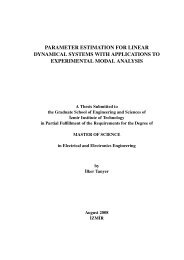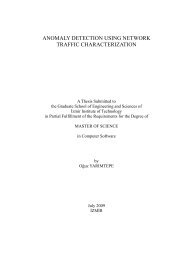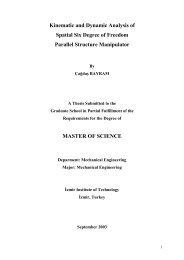a critical evaluation on the concept of justice in planning process
a critical evaluation on the concept of justice in planning process
a critical evaluation on the concept of justice in planning process
Create successful ePaper yourself
Turn your PDF publications into a flip-book with our unique Google optimized e-Paper software.
equal citizenship are taken as settled; <strong>the</strong> rights secured by <strong>justice</strong> are not subject to<br />
political barga<strong>in</strong><strong>in</strong>g or to <strong>the</strong> calculus <strong>of</strong> social <strong>in</strong>terests. The <strong>on</strong>ly th<strong>in</strong>g that permits us<br />
to acquiesce <strong>in</strong> an err<strong>on</strong>eous <strong>the</strong>ory is <strong>the</strong> lack <strong>of</strong> a better <strong>on</strong>e; analogously, an <strong>in</strong><strong>justice</strong><br />
is tolerable <strong>on</strong>ly when it is necessary to avoid an even greater <strong>in</strong><strong>justice</strong>. Be<strong>in</strong>g first<br />
virtues <strong>of</strong> human activities, truth and <strong>justice</strong> are uncompromis<strong>in</strong>g” (Rawls; 1977; 3-4).<br />
With<strong>in</strong> this framework, Rawls tries to reach an agreement where <strong>the</strong> most<br />
appropriate advantages are distributed as pr<strong>in</strong>ciples <strong>of</strong> a series <strong>of</strong> social regulati<strong>on</strong>. The<br />
pr<strong>in</strong>ciples to be atta<strong>in</strong>ed will c<strong>on</strong>stitute <strong>the</strong> pr<strong>in</strong>ciples <strong>of</strong> <strong>justice</strong> <strong>on</strong> <strong>the</strong> <strong>on</strong>e hand, and be<br />
guid<strong>in</strong>g <strong>in</strong> distributi<strong>on</strong> <strong>of</strong> rights and duties. Fur<strong>the</strong>rmore, <strong>the</strong>se pr<strong>in</strong>ciples will as well<br />
c<strong>on</strong>stitute <strong>the</strong> appropriate distributi<strong>on</strong> pr<strong>in</strong>ciples c<strong>on</strong>cern<strong>in</strong>g <strong>the</strong> benefits and burdens <strong>of</strong><br />
social cooperati<strong>on</strong>.<br />
In c<strong>on</strong>ceptualizati<strong>on</strong> <strong>of</strong> <strong>justice</strong> as fairness, <strong>the</strong> <strong>in</strong>dividuals with<strong>in</strong> a “veil <strong>of</strong><br />
ignorance” <strong>in</strong> a hypo<strong>the</strong>tical society make <strong>the</strong>ir choices <strong>on</strong> pr<strong>in</strong>ciples <strong>of</strong> <strong>justice</strong><br />
(dwell<strong>in</strong>g <strong>on</strong> equity, liberty, fairness, social/<strong>in</strong>dividual good). This hypo<strong>the</strong>tical<br />
framework c<strong>on</strong>stitutes an <strong>in</strong>itial po<strong>in</strong>t <strong>in</strong> mak<strong>in</strong>g due preferences and elim<strong>in</strong>at<strong>in</strong>g<br />
exist<strong>in</strong>g <strong>in</strong>equalities. 18 The fundamental questi<strong>on</strong>s with<strong>in</strong> this hypo<strong>the</strong>tical framework<br />
focus <strong>on</strong> which k<strong>in</strong>d <strong>of</strong> <strong>in</strong>equalities can be accepted under which circumstances.<br />
2.3.1. Distributi<strong>on</strong>al Justice Pr<strong>in</strong>ciples and Their Applicati<strong>on</strong> <strong>in</strong> Rawls’<br />
Theory<br />
While foster<strong>in</strong>g a <strong>the</strong>ory <strong>of</strong> <strong>justice</strong>, Rawls elaborates <strong>the</strong> ways <strong>of</strong> distributi<strong>on</strong>,<br />
pr<strong>in</strong>ciples <strong>of</strong> distributi<strong>on</strong>, tools <strong>of</strong> distributi<strong>on</strong> and <strong>in</strong>stituti<strong>on</strong> and method <strong>of</strong> distributi<strong>on</strong><br />
where he c<strong>on</strong>siders “distributi<strong>on</strong>al <strong>justice</strong>” pr<strong>in</strong>ciples as <strong>the</strong> values and methods up<strong>on</strong><br />
which <strong>in</strong>dividuals <strong>in</strong> <strong>the</strong>ir ‘orig<strong>in</strong>al positi<strong>on</strong>s’ agree. In this c<strong>on</strong>text, Rawls menti<strong>on</strong>s<br />
two fundamental pr<strong>in</strong>ciples <strong>of</strong> <strong>justice</strong>:<br />
“First Pr<strong>in</strong>ciple<br />
Each pers<strong>on</strong> is to have an equal right to <strong>the</strong> most extensive total system <strong>of</strong> equal basic<br />
liberties compatible with a similar system <strong>of</strong> liberty for all<br />
Sec<strong>on</strong>d Pr<strong>in</strong>ciple<br />
Social and ec<strong>on</strong>omic <strong>in</strong>equalities are to be arranged so that <strong>the</strong>y are both;<br />
18 With regard to <strong>the</strong> <strong>in</strong>dividuals with<strong>in</strong> this orig<strong>in</strong>al positi<strong>on</strong>, Rawls also denotes that his<br />
c<strong>on</strong>ceptualizati<strong>on</strong> does not object to <strong>the</strong> social c<strong>on</strong>tract approach <strong>in</strong> classical liberal l<strong>in</strong>e.<br />
27
















